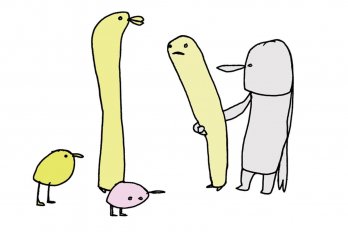podbiel—“Where are all the ducks? ”
That was Adela’s first question as our rental car slipped past the cemetery and down into the tiny village of Podbiel. My wife’s aunt was born here in Slovakia (the quality of my Christmas gifts would plummet if I revealed when), but moved to Canada with her parents when she was three and a half. She’s joined us on our pilgrimage to Podbiel, serving as our unofficial translator. “I feel like a salmon returning to the stream before it dies,” she told me as we unpacked the car.
My first question came at seven the next morning: “What the hell is that? ” Throughout the village, a hearty folk tune burped through loudspeakers, followed by a maniacal call to action: “Comrades are required to report to field 11B for the Great Beet Harvest provided by our Dear Leader. Then all will eat from the iron sauerkraut pot before stoking the coke ovens in sector 9S. Now bow your heads in a prayer to Marx,” screamed the voice. Or so I imagined. At breakfast, I asked Adela for a translation. “Oh, those were advertisements for the grocery store: ‘Come shop at the market. Potatoes cost so many koruna, meat so many koruna.’ That type of thing.”
Crass advertisements blaring out of speakers at ungodly hours and a paucity of ducks wandering the main street of Podbiel are symptoms of the same phenomenon: the village has been reeling since this country of 5.4 million joined the European Union on May 1, 2004. Twenty years ago, Podbiel’s main street was a sleepy lane guarded by a curious old man checking on who came and went. Ducks dodged cows lumbering home from the emerald pastures that drape the surrounding hills. Ten years ago, the old man was gone, but the cows and ducks remained.
Today any duck that risked wandering the streets of Podbiel would get squashed. The main street is part of Highway E77, the central link to Poland. Convoys of trucks rumble through town all day at twice the posted speed limit. Dodging traffic to visit the town’s main tourist attraction—a row of ancient wooden houses across the road from where we’re staying—qualifies as an extreme sport. Podbiel has become a clogged artery in a Euromarket on steroids.
Elsewhere, Slovakian highways are receiving major updates and are pumping more trucks toward Poland: two lanes bloat to four, giant borers hollow out tunnels, glowing white concrete bridges leap across rivers—all thanks in part to EU funding. The borders with Hungary, Austria, the Czech Republic, and Poland have all but disappeared, and the flow of goods continues to escalate. When we entered the country by bus from Austria, our Slovak driver (sporting a pompadour that would send the lead singer of the B-52s scrambling for more mousse) announced: “Please everyone to be kind and remove your passports for the checking at the border.” It was unnecessary. With a flick of his hand, the border guard, now merely bored, waved us through.
And then there are the billboards.
What’s the deal with old socialists and billboards? In Vietnam, the road into Hanoi from the Noi Bai airport is crammed with them, some the size of cruise ships, extolling the virtues of Heineken. Same with Beijing and, as it turns out, Slovakia. Here the milk chocolate fields yield bumper crops of billboards. They advertise Korean four-by-fours, Tesco supermarkets from England, and a type of Czech liquor that apparently arouses in all women the desire to neck passionately with one another.
Outside most villages, you’ll find a midnight blue cartoon of a euro coin with two grasping hands and the caption “ Boj í te sa eura? ” (“Are you afraid of the euro? ”). The country will soon replace the koruna with the euro, and as prices have jumped with the adoption of the new currency in Greece, Portugal, and Spain—in fact, just about everywhere in Europe—Slovakia will be no different. But while policy-makers (many of them former communists) are more than happy to allemande-right to the call of the global capitalist square dance, many ordinary Slovaks would rather sit this one out. Thus the billboards: they ridicule the opposition and squash any ducks questioning Slovakia’s integration into the global economy.
I asked Adela’s childhood friend what she thinks about all this, and got an earful. “In the old days, on a day like today people would drop in and help each other with the knitting or whatever else needed to be done. Now nobody has time for that. Before, work in the fields was difficult, but then you also could stop and talk and eat with people under a tree. It was a different pace. Now everyone goes fast.” And don’t get her started on the privatization of gas, electricity, and water since 1991, and the corresponding leap in prices. For her, it’s not if the government will privatize the medical system, but when.
Faster and faster and faster. As one relative told me over too many glasses of homemade slivovica: “Do you know a Slovak invented the parachute? His name was Štefan Banic.” Podbiel, he intimated, could use more Štefan Banics right now.



